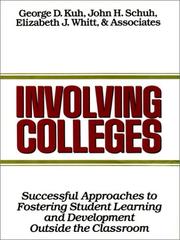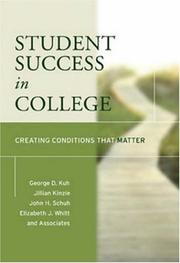| Listing 1 - 7 of 7 |
Sort by
|
Book
Year: 1981 Publisher: Washington American association for higher education
Abstract | Keywords | Export | Availability | Bookmark
 Loading...
Loading...Choose an application
- Reference Manager
- EndNote
- RefWorks (Direct export to RefWorks)
Book
ISBN: 1620365065 9781620365069 9781620365076 1620365073 9781620365045 1003445098 1000972305 Year: 2017 Publisher: Sterling, Virginia : Stylus Publishing,
Abstract | Keywords | Export | Availability | Bookmark
 Loading...
Loading...Choose an application
- Reference Manager
- EndNote
- RefWorks (Direct export to RefWorks)
Electronic portfolios in education. --- Education, Higher --- Universities and colleges --- Colleges --- Degree-granting institutions --- Higher education institutions --- Higher education providers --- Institutions of higher education --- Postsecondary institutions --- Public institutions --- Schools --- Technological innovations --- ePortfolios in education --- Portfolios in education --- Effect of technological innovations on. --- Aims and objectives. --- Planning --- Technological innovations.
Book
ISBN: 1928424090 1928424082 Year: 2017 Publisher: Bloemfontein UJ Press
Abstract | Keywords | Export | Availability | Bookmark
 Loading...
Loading...Choose an application
- Reference Manager
- EndNote
- RefWorks (Direct export to RefWorks)
The book provides a rich, informative picture of the current state of student engagement evaluation, while also highlighting challenges and opportunities for future advances. A particular strength of this publication is its emphasis on the importance of taking evidence-based decisions, and showing how the South African Survey of Student Engagement (SASSE) can provide the evidence for well-informed changes in policy and practice in order to enhance student success." - Prof Magda Fourie-Malherbe, Stellenbosch University
Higher & further education, tertiary education --- Academics --- Academic achievement --- Academic advising --- Academic advisors --- Academic challenge --- Academic development --- Academic literacy --- Academic performance --- Academic support --- Access --- Academic staff (also see academics/Lecturers) --- Actionable --- Active learning --- Agency --- Aggregated --- Analyse --- Apply --- Ask questions --- Assessment --- Attitude --- Australasian Survey of Student Engagement (AUSSE) --- Beginning University Survey of Student Engagement (BUSSE) --- Benchmarking --- Bloom’s taxonomy --- Business --- economics and management --- Campus environment --- Capacity --- Career advisors --- Challenges --- Classroom activities --- Classroom Survey of Student Engagement (CLASSE) --- Co-curricular (also see extra-curricular) --- Cognitive --- Cognitive development --- Cognitive educational activities --- Cognitive functions --- Cognitive skills --- Collaborative learning --- Colleges --- Community college --- Comprehensive universities --- Conditional formatting --- Contextual --- Contextual challenges --- Contextualised --- Council on Higher Education (CHE) --- Course (module/subject) --- Critical thinking --- Culture --- Curriculum --- Data --- Data-informed --- Decision-making --- Decolonisation --- Deep learning --- Department chairs (heads of departments) --- Department of Higher Education and Training (DHET) --- Development --- Developmental outcomes --- Diagnostic --- Disaggregating --- Discussions --- Discussion with diverse others --- Dropout --- Education outcomes --- Effective educational behaviours --- Effective educational practices --- Effective leadership --- Effective teaching practices --- Empirical --- Engagement – also see Student Engagement --- Engineering --- Equity --- Equitable outcomes --- Evaluate --- Evidence --- Evidence-based --- Expectations --- Expected academic difficulty --- Expected academic perseverance --- Experiential learning --- Experience with staff --- Extended degree --- Extended curricula --- Extra-curricular (also see co-curricular) --- Financial Stress Scale --- First-generation --- First-year --- Food --- Food insecurity --- Frequency --- Freshman myth --- Gender --- Graduate attributes (Learning outcomes) --- Group work --- Heads of departments --- High-Impact practices --- Higher education outcomes --- Higher-Order Learning --- Holistic --- Humanities --- Incentive --- Indicators --- Innovation --- Innovative --- Instructional paradigm --- Interactions --- Interventions --- Institutional culture --- Institutional performance --- Institutional research --- Institutional researchers --- Institution-wide approaches --- Interpersonal relationships --- Interpersonal skills --- Intersectional --- Intersectionality --- Irish Survey of Student Engagement (ISSE) --- Knowledge --- Knowledge society --- Language --- Law --- Leaders --- Leadership (management/university leadership) --- Learning --- Learning environments --- Learning facilitator --- Learning outcomes --- Learning paradigm --- Learning strategies --- Learning with peers --- Lecturer Survey of Student Engagement (LSSE) --- Lecturers (also see academics/academic staff) --- Librarians --- Management (University leaders and Leadership) --- Mathematics --- Memorisation --- Mentor --- Mentoring --- Mentorship --- Mission --- Module (course/subject) --- Motivation --- National Benchmark Tests (NBT) --- National Benchmark Test Project (NBTP) --- National Development Plan --- National Survey of Student Engagement (NSSE) --- Natural and Agricultural Sciences --- Next Generation of Academics Programme (nGAP) --- Numeracy development --- Off-campus --- On-campus --- Online resources --- Pathways --- Peer learning (also see Tutor) --- Pedagogical approaches --- Pedagogical contexts --- Pedagogical environments --- Pedagogical experiences --- Pedagogical innovation --- Pedagogical practices --- Pedagogical relationship --- Pedagogical responsiveness --- Pedagogies --- Perceived academic preparation --- Perceived preparedness --- Persistence --- Policies --- Policy --- Policy makers --- Practical significance --- Practical work --- Preparing for class --- Professional development --- Professionals --- Professional staff --- Quadrant --- Quality --- Quality assurance --- Quality of interactions --- Quantitative reasoning --- Reflection --- Reflective and integrative learning --- Relationships --- Research --- Responsiveness --- Resources --- Retention --- Science --- engineering and technology --- Self-reflection --- Senior students --- Service learning --- Social sciences --- Socio-economic --- South African Survey(s) of Student Engagement (SASSE) --- Staff development (also academic development and lecturer development) --- Stakeholder --- Strategies --- Statistical --- Student affairs --- Student behaviour --- Student bodies --- Student data --- Student development --- Student engagement --- Student evaluation --- Student financial aid --- Student involvement --- Student learning --- Student life --- Student needs --- Student outcomes --- Student organisations --- Student perspective --- Student participation --- Student performance --- Student persistence --- Student retention --- Student responses --- Student societies --- Student-staff interaction --- Student success --- Student views --- Student voice --- Success rates --- Subject (course/module) --- Support services --- Support staff --- Supportive campus --- Supportive environment --- Synthesise --- Systemic perspective --- Systemic understanding --- Teaching --- Teaching and learning --- Techniques --- Time --- Time management --- Traditional universities --- Transformation --- Transformative --- Transition --- Tutor --- Tutorials --- Undergraduate research --- Underprepared --- United States --- University Capacity Development Grant (University Capacity Development Programme) --- Universities --- Universities of Technology --- University leaders --- Unrealistic --- Well-being

ISBN: 9781555423056 1555423051 Year: 1991 Publisher: San Francisco (Calif.): Jossey-Bass,
Abstract | Keywords | Export | Availability | Bookmark
 Loading...
Loading...Choose an application
- Reference Manager
- EndNote
- RefWorks (Direct export to RefWorks)
Universities and colleges --- College students --- Learning --- Student activities --- Personality development

ISBN: 0787979147 Year: 2005 Publisher: San Farncisco, Calif., U.S.A. Wiley
Abstract | Keywords | Export | Availability | Bookmark
 Loading...
Loading...Choose an application
- Reference Manager
- EndNote
- RefWorks (Direct export to RefWorks)
Study methods --- slaagkansen --- studiemethode-begeleiding --- studievaardigheden

ISBN: 1878380648 Year: 1994 Publisher: S.l. George Washington university. Graduate school of education and human development
Abstract | Keywords | Export | Availability | Bookmark
 Loading...
Loading...Choose an application
- Reference Manager
- EndNote
- RefWorks (Direct export to RefWorks)
College environment --- College students --- Experiential learning --- Student activities
Book
ISBN: 1003442757 1000974502 1003442757 1620364735 Year: 2018 Publisher: New York, New York : Routledge,
Abstract | Keywords | Export | Availability | Bookmark
 Loading...
Loading...Choose an application
- Reference Manager
- EndNote
- RefWorks (Direct export to RefWorks)
For many students, working while in college is a defining characteristic of the undergraduate experience. However, student workers often view campus employment as a money-making opportunity rather than a chance for personal development. Likewise, institutions often neglect to consider campus jobs as a means to education and student engagement.It is the distinction between work for remuneration and work for personal development which shapes much of the discussion of student employment throughout A Good Job. This book makes the case for campus employment as a high-impact practice in higher education and provides models for institutional efforts to implement new student employment strategies.Carefully designed campus employment opportunities can have numerous benefits, including career exploration and preparation, learning, and increased engagement leading to increased retention. The authors make the case that employment can and should be a purposeful and powerful component in any higher education institution's efforts to support student learning, development, and success.This book is an excellent resource for anyone interested in capitalizing on the developmental and learning potential of student employment on campus.
College dropouts --- College dropouts --- College student development programs --- College students --- Education, Cooperative --- Prevention. --- Prevention. --- Employment
| Listing 1 - 7 of 7 |
Sort by
|

 Search
Search Feedback
Feedback About UniCat
About UniCat  Help
Help News
News